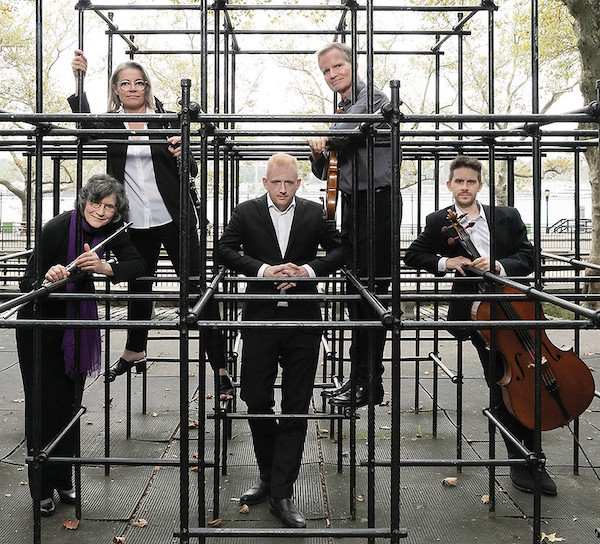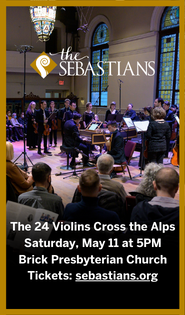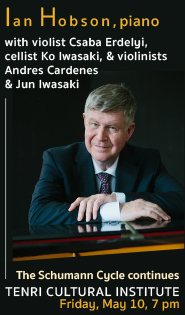Da Capo Chamber Players mark 50 years with lively mix of past and present
Fifty years as a performing ensemble is a prodigious achievement in and of itself. For the Da Capo Chamber Players, that also means a series of 50th anniversary concerts.
The second such program took place Tuesday night in Merkin Hall, with the title “Bridging Styles,” and represented Da Capo at its best, playing, in their own words, “excellent pieces in the full stylistic spectrum of today’s composers.” For this concert, the penultimate in their anniversary series, that meant music from Judith Shatin, Jason Eckardt, Erica Lindsay, Elliott Carter, and Steve Reich. Every work except Carter’s was made this century, and Shatin, Eckardt, and Lindsay were all on hand—with Lindsay joining the ensemble.
Bringing all this together meant traversing a wide range of contemporary styles, including versions of romanticism and expressionism, jazz, Carter’s sui generis high modernism—via Con leggerezza pensosa, and Reich’s superb, minimalist Double Sextet.
Da Capo opened with Shatin’s Gregor’s Dream, which paints the central event of Kafka’s The Metamorphosis, as the protagonist Gregor, wakes up to find himself turned into a beetle. The piece is scored for an amplified trio (violinist Curtis Macomber, cellist Chris Gross, and pianist Steven Beck) with prerecorded audio made with processed field recordings, including sounds of Asian Longhorn beetles and mountain pine beetles. With a careful performance from the musicians, the piece came off as an unusual soundtrack to a soundtrack, the audio portion abstract and evocative, while the live music was an explicit narrative of this nightmare, passing through foreboding, shock, anxiety, and a feeling of resignation. This was minor key, dramatic music with themes that delivered explicit settings and sentiments.
Eckardt’s Rendition is one of his tough-minded pieces that express his anger over the U.S. government torture programs, this one reaching into the Clinton-era establishment of the macabrely euphemistic “extraordinary rendition.” Extraordinary indeed, and the music has a haunting power. A duet for piano and bass clarinet (Marianne Gythfeldt), the music has some of the most impressive writing for the woodwind one has heard, and an equally impressive performance from Gythfeldt.
The music flows along in a quasi-stream of consciousness manner, bringing back small phrases and gestures as it rises into the bass clarinet’s upper register. Rendition is full of subtle false fingerings and quick portamentos that are both provocative and unsettling. Hearing this music was like being pulled along in a slow, murky current, too weighted down by water to escape, an unsettling expression of being subject to forces beyond one’s control.
Lindsay’s Further Explorations was an example of that true rarity, a jazz composition for non-jazz players that works wonderfully well. As flutist Patricia Spencer related to the audience, Lindsay—who played tenor saxophone—helped coach Da Capo through the process of improvisation.
With stellar jazz musicians bassist Mark Helias and drummer Allan Medard augmenting the ensemble, Da Capo gave a terrific performance. Lindsay wrote a beautiful melody, long-limbed and full of enlightening twists and turns, with rich harmonization underneath, and the improvisations were strong and imaginative. Spencer was impressive in the way she built and colored phrases, and as a whole the ensemble sounded expert in how they listened and worked with space.
There was a noticeable change in atmosphere after intermission, with the music from Carter and Reich. As good as Da Capo sounded in the first half, there was a real quality of familiarity in these works, things the musicians likely had played many times before.
Gythfeldt, Macomber, and Gross played Con leggerezza pensosa, Carter’s tribute to Italo Calvino. It was a pleasure to hear the musicians give such confident weight to each of Carter’s notes. One heard this piece with new clarity, Carter’s intervals and judicious repetitions forming a quirky, solid structure.
Double Sextet was powerful and exciting. For this performance, the sextet on stage, with percussionist Oliver Xu joining Spencer, Gythfeldt, Macomber, Gross, and Beck, was doubled by a backing tape. The playing was full of refined force and momentum, the musicians making the most out of Reich’s syncopations and accents. Xu was so energetic that his enthusiasm fitfully muddled his playing, but the drive that emanated from his vibraphone was palpable, and essential to the thrill of the performance.
The Da Capo Chamber Players will present “Bridging Eras: Then and Now,” 8 p.m. June 9, at Merkin Hall. dacapochamberplayers.org







